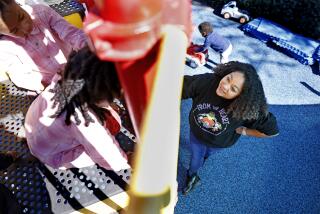Young Adjust : Children of Mothers in Jobs Tracked
- Share via
Working mothers may work harder at being mothers, but children adjust just as well with mothers who work as they do with mothers who don’t, a new study shows.
“A mother’s employment has no impact on a child’s development,” said Adele E. Gottfried, a professor of psychology at California State University, Northridge.
She and her husband, Allen Gottfried, a professor of psychology at Cal State Fullerton, have tracked a group of Orange County children for the last six years, as they grew from infancy to age 7.
The study started with 130 children. Ninety percent of them are still involved, Adele Gottfried said.
36% of Mothers Employed
When the children were infants, 36% of the mothers involved were employed. By the time the children were 5, 56% of the mothers were employed, she said.
The licensed psychologists measured the emotional, social and intellectual growth of the children, while examining the mothers’ attitudes toward employment and family life.
Most of the mothers involved in the study were married and those who worked averaged 32 hours of employment a week, Gottfried said.
Child development was recorded by using a variety of objective and standardized measures, she said, on intellect, cognition, school achievement, social reasoning skills and behavioral adjustment.
Mothers were asked to fill out questionnaires.
Attitude Toward Job
Employment did not influence the development of children, but the attitudes of the mothers toward employment influenced the mothers, Gottfried said.
“We asked them the major reason for their employment--personal satisfaction or income. They relate to each other in interesting ways, although most mothers said they worked for both reasons to greater or lesser degrees.
“If you are working for personal satisfaction, you tend to feel less stressed relating to your child. The more positive you feel about your employment, the more you can coordinate home and work responsibilities,” she said.
“If you are working for income, you feel more stressed when relating to the child, you feel like you are prevented from spending time with the child and are less able to coordinate family and job responsibilities,” she said.
The findings should give working mothers a feeling of self-confidence, she said. “Employment does not mean we are not paying attention to our children. Mothers need not feel guilty about their employment.”









